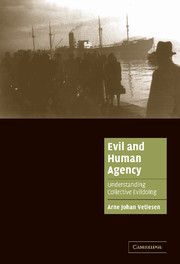Book contents
- Frontmatter
- Contents
- Preface
- A note on the cover image
- Introduction
- 1 The ordinariness of modern evildoers: a critique of Zygmunt Bauman's Modernity and the Holocaust
- 2 Hannah Arendt on conscience and the ‘banality’ of evil
- 3 The psycho-logic of wanting to hurt others: An assessment of C. Fred Alford's work on evil
- 4 The logic and practice of collective evil: ‘ethnic cleansing’ in Bosnia
- 5 Responses to collective evil
- 6 A political postscript: globalization and the discontents of the self
- References
- Index
- Evil and human agency
6 - A political postscript: globalization and the discontents of the self
Published online by Cambridge University Press: 10 December 2009
- Frontmatter
- Contents
- Preface
- A note on the cover image
- Introduction
- 1 The ordinariness of modern evildoers: a critique of Zygmunt Bauman's Modernity and the Holocaust
- 2 Hannah Arendt on conscience and the ‘banality’ of evil
- 3 The psycho-logic of wanting to hurt others: An assessment of C. Fred Alford's work on evil
- 4 The logic and practice of collective evil: ‘ethnic cleansing’ in Bosnia
- 5 Responses to collective evil
- 6 A political postscript: globalization and the discontents of the self
- References
- Index
- Evil and human agency
Summary
We come full circle in this inquiry into evil when I reiterate that what makes us suffer evil is also what makes us want to cause it. Much evildoing springs from the fact that our being-in-the-world is shot through with vulnerability, concretized by our mortality and by our dependence on others, to name but two different aspects of the same basic condition. In this perspective, evildoing is an existential project in which the individual, finding his non-chosen vulnerability intolerable, seeks ways to get rid of it, hoping to do so by transporting the vulnerability to others so as to feel some control over it. This is the sense in which evildoing is a protest against vulnerability or, more accurately, against vulnerability-induced limits: limits to what and who we are and can be, emphatically our limits, yet limits not of our making; hence, limits that define our very being. While universally, because anthropologically, given, this vulnerability and the limits that go with it have to be faced individually, as something awaiting responses in the first-person singular.
This is fine as far as existential(ist) approaches to evil go. But as I have tried to show, especially by means of the historical material invoked in Chapters 4 and 5, not all evil is this individual, be it in its causes or its effects.
- Type
- Chapter
- Information
- Evil and Human AgencyUnderstanding Collective Evildoing, pp. 289 - 298Publisher: Cambridge University PressPrint publication year: 2005

